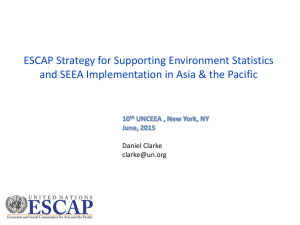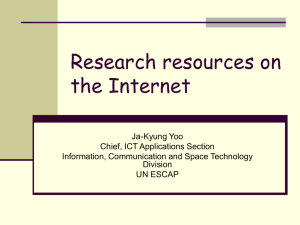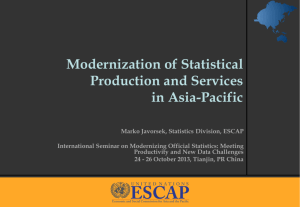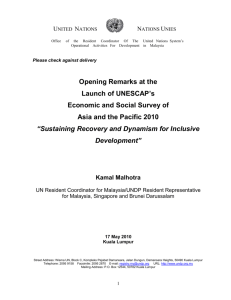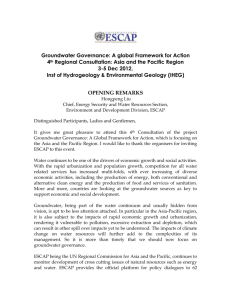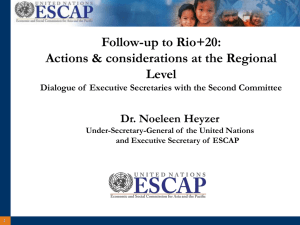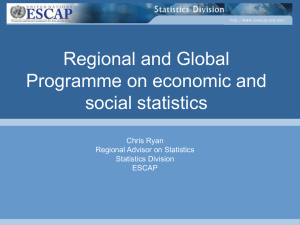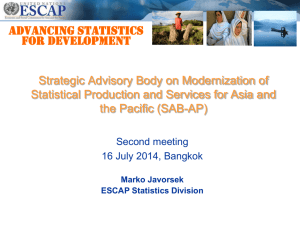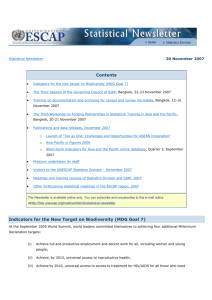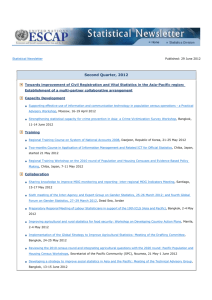Second Quarter, 2013 Features 69th session of the ESCAP
advertisement
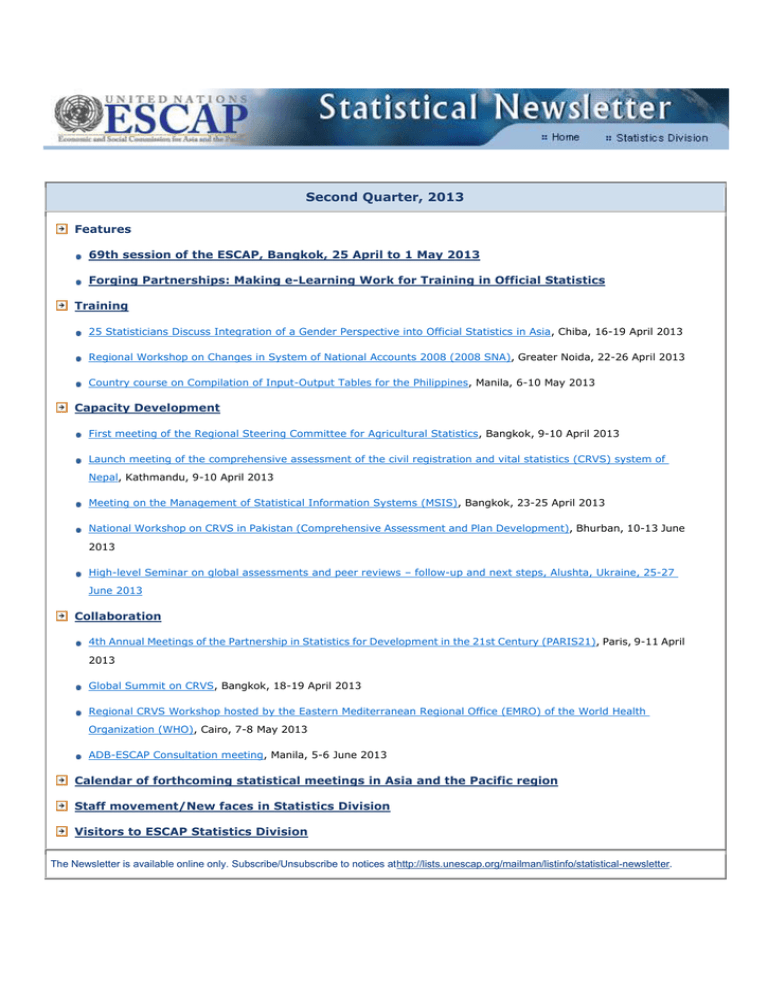
Second Quarter, 2013 Features 69th session of the ESCAP, Bangkok, 25 April to 1 May 2013 Forging Partnerships: Making e-Learning Work for Training in Official Statistics Training 25 Statisticians Discuss Integration of a Gender Perspective into Official Statistics in Asia, Chiba, 16-19 April 2013 Regional Workshop on Changes in System of National Accounts 2008 (2008 SNA), Greater Noida, 22-26 April 2013 Country course on Compilation of Input-Output Tables for the Philippines, Manila, 6-10 May 2013 Capacity Development First meeting of the Regional Steering Committee for Agricultural Statistics, Bangkok, 9-10 April 2013 Launch meeting of the comprehensive assessment of the civil registration and vital statistics (CRVS) system of Nepal, Kathmandu, 9-10 April 2013 Meeting on the Management of Statistical Information Systems (MSIS), Bangkok, 23-25 April 2013 National Workshop on CRVS in Pakistan (Comprehensive Assessment and Plan Development), Bhurban, 10-13 June 2013 High-level Seminar on global assessments and peer reviews – follow-up and next steps, Alushta, Ukraine, 25-27 June 2013 Collaboration 4th Annual Meetings of the Partnership in Statistics for Development in the 21st Century (PARIS21), Paris, 9-11 April 2013 Global Summit on CRVS, Bangkok, 18-19 April 2013 Regional CRVS Workshop hosted by the Eastern Mediterranean Regional Office (EMRO) of the World Health Organization (WHO), Cairo, 7-8 May 2013 ADB-ESCAP Consultation meeting, Manila, 5-6 June 2013 Calendar of forthcoming statistical meetings in Asia and the Pacific region Staff movement/New faces in Statistics Division Visitors to ESCAP Statistics Division The Newsletter is available online only. Subscribe/Unsubscribe to notices athttp://lists.unescap.org/mailman/listinfo/statistical-newsletter. 69th session of the United Nations Economic and Social Commission for Asia and the Pacific (ESCAP) Bangkok, 25 April - 1 May 2013 The theme for this year’s Commission session was ‘Building resilience to natural disasters and major economic crises’. It was attended by 1,000 participants from 47 member and associate member states and 12 other states, including: three heads of state or government (Myanmar, Solomon Islands and Timor-Leste); four deputy prime ministers; over 30 serving and former ministers, and the Deputy Secretary-General of the United Nations, Mr. Jan Eliasson. Statistical resolutions During the Commission session member states endorsed 17 resolutions, including two related to statistical capacity building on civil registration and vital statistics (CRVS) and population and social statistics. Implementing the Outcome of the High-level Meeting on Civil Registration and Vital Statistics in Asia and the Pacific – ESCAP resolution 69/15 Sponsored by Philippines and co-sponsored by Australia, Bangladesh, Cambodia, Japan and Turkey. Requests ESCAP and its partners to convene a regional ministerial meeting on CRVS in 2014 and for the establishment of a regional steering group on CRVS. Both will include stakeholders from the civil registration and health sectors as well as national statistical organizations. Additionally, calls for countries to conduct assessments of CRVS systems, supports the Committee on Statistics’ endorsement of the Regional Strategic Plan for the Improvement of CRVS in Asia and the Pacific, and calls on development partners to embark on a well-coordinated funding and advocacy campaign to strengthen CRVS in the region. A core set of population and social statistics to guide national capacity development in Asia and the Pacific – ESCAP resolution 69/16 Sponsored by Australia and co-sponsored by China, Indonesia, The Islamic Republic of Iran, Japan and Philippines. Calls for member states to use the core set of population and social statistics, which was approved at the third session of the Committee on Statistics, as the framework and guide for developing national statistical systems. The implementation of this resolution will include the development of a detailed regional programme and monitoring of baseline statistical capacity and improvements. Election to the governing council of the Statistical Institute for Asia and the Pacific (SIAP) The Commission also elected a new governing council to review the administration and financial status of SIAP and implement its work programmes. Each council is elected for three years and is formed by a representative designated by the government of Japan plus eight representatives nominated by other members and associate members of ESCAP. Sixteen countries nominated themselves for the governing council, the largest number of nominations ever received, and an election was held on the fifth day of the Commission. Two parallel counts of the votes cast by members were openly conducted in front of eager delegates, resulting in the following countries being elected to serve on the governing council from 2013 to 2016: Australia China India Indonesia Philippines Republic of Korea Russian Federation Thailand The new Governing Council will meet for the first time in November 2013 at Chiba, Japan. Other statistical news from the Commission session On the first day of the session, senior officials reviewed substantive issues of the eight Committees of the Commission. Delegates from eleven countries made statements of strong support for Statistics Division’s work and its two strategic goals of capacity building and modernizing information management in national statistical offices. Among the many key messages emerging from the review included recognition of the critical importance of statistics in laying the foundation for effective policy and the Commission urged member states to give priority to developing their capacity to produce official statistics. Particular note was also made of the high quality and relevance of the statistical yearbook and the clear progress being made in Statistics Division’s work programme including in CRVS, population and social statistics, environment statistics and economic statistics. Forging Partnerships: Making e-Learning Work for Training in Official Statistics Representatives of national statistical training institutes, academic institutions and international agencies participating in the Fifth Workshop on Forging Partnerships in Statistical Training in Asia and the Pacific: Making e-Learning Work for Us, recommended establishing a collaborative partnership of statistical training providers for effective delivery of e-learning courses on official statistics through a network of platforms under the umbrella of a central portal. The Statistical Institute for Asia and the Pacific (SIAP) in collaboration with the Japanese Ministry of Internal Affairs and Communication organized the workshop held in Chiba, Japan from 24-26 June 2013. The central portal will provide a common platform for sharing, jointly developing and delivering e-learning courses for reaching a wide range and a large number of trainees. The collaborative partnership is also expected to accelerate the expansion of e-learning as a modality for training in official statistics in countries and the assuring of quality in e-learning courses. The idea behind the establishment of a central portal is an adaptation of the massive open online course (MOOC) philosophy that takes into account the requirements of training on official statistics. The workshop constructed a road map for setting up the common platform and deliberated on collaboration mechanisms to be adopted including sharing of infrastructure, existing courseware, expertise, course-designing tools and other related tasks of developing and running courses. SIAP, with the support of partner international agencies Secretariat of the Pacific Community (SPC) and the Asian and Pacific Training Centre for Information Communication Technology for Development (ESCAP-APCICT), will initiate the task of establishing the founding partners group for developing the common platform and defining its terms of reference. Representatives from Australian Bureau of Statistics, National Academy of Statistical Administration (India), Education and Training Centre (Statistics Indonesia), Statistical Research and Training Centre (Philippines) and Federal State Statistics Service (Russian Federation), Korea National Open University, Japanese Inter-university Network for Statistical Education (JINSE), and University of South Pacific expressed readiness to get involved right away. Other participants, including from the National Bureau of Statistics (China), Statistical Centre of Iran, Statistical Research and Training Institute (Japan), National Statistical Office (Thailand) and Institute of Statistical Science (Vietnam), would seek their respective management support for participating in the common platform. The workshop also recommended that a course on basic data analysis could be developed by SIAP, KNOU and ESCAP-APCICT as a pilot course to be offered through the common platform. Training 25 Statisticians Discuss Integration of a Gender Perspective into Official Statistics in Asia, Chiba, 16-19 April 2013 A regional Workshop on Improving the Integration of a Gender Perspective into Official Statistics was held from 16 to 19 April 2013 in Chiba, Japan. The workshop was organized by the United Nations Statistics Division (UNSD) and the Statistical Institute for Asia and the Pacific (SIAP), in cooperation with the Ministry of Internal Affairs and Communications (MIC) of the Government of Japan. The main objective of the workshop was to strengthen capacity of national statisticians to improve the integration of a gender perspective into official statistics. Twenty five participants from 15 National Statistical Offices in Asia (Bangladesh, China, India, Indonesia, Lao PDR, Malaysia, Maldives, Myanmar, Mongolia, Nepal, the Philippines, Sri Lanka, Thailand, Viet Nam and observers from Japan) and representatives from UNSD, UNFPA, the WB and SIAP discussed three manuals on gender statistics: (1) the United Nations Manual on Integrating a Gender Perspective into Statistics, (2) Guidelines for Producing Statistics on Violence against Women: Statistical Surveys, and (3) the UNFPA/UNSD/UNWomen Guide on Gender Analysis of Census Data. The participants recognized usefulness of the guidelines in production and analysis of gender statistics in different fields of official statistics including health, work, poverty, environment, violence against women, and tabulation and analysis of population and housing data, and exchanged their experiences in compilation and dissemination of gender statistics under each topic. Global initiatives were reviewed, such as the global overview of gender statistics and minimum set of gender indicators and the work of ESCAP Committee on Statistics on developing a regional programme for improving gender statistics in Asia-Pacific region. At the end of the workshop, participants developed a 12-month national plan for mainstreaming gender perspective into all statistical activities from the view point of decision makers, coordinators, data producers, and data analysers. Regional Workshop on Changes in System of National Accounts 2008 (2008 SNA), Greater Noida, 22-26 April 2013 The Statistical Institute for Asia and the Pacific (SIAP), in collaboration with the National Academy of Statistical Administration (NASA) of the Central Statistical office (CSO) of India, conducted a Regional Training Programme on the System of National Accounts 2008: Fifth Regional Workshop on Change in 2008 SNA from 22 to 26 April 2013 at NASA in Greater Noida, India. The course was designed to provide a comprehensive view of the changes made in the 2008 SNA. The main objective of the course was to strengthen the capacity of national statistical offices in implementing the recommendations of 2008 SNA, and reviewing the current compilation practices for improving the quality and coverage of national accounts statistics of the respective countries. Topics covered in the course included overview of the change in the 2008 SNA, challenges in implementing 2008 SNA in countries of participants and challenges faced at regional level estimates of GDP. The course was designed for middle-level government statisticians who perform tasks related to compilation of national accounts. A total of twenty participants – twelve from host country India, all from State Directorates of Economics and Statistics, and eight from other member countries, namely Afghanistan, Cambodia, Fiji, Kazakhstan, Singapore, Sri Lanka, Tajikistan and Viet Nam – attended the training course. The result of the workshop’s survey demonstrates the relevance of this training. Most of the participants (12 out of 20) considered the workshop as very useful, while the rest considered it useful. With regards to confidence in implementing knowledge/skills in their work upon returning home, most participants (18 out of 20) thought it had improved, while the remaining thought it had fairy improved. There is good demand for repeating this course at country and sub-regional levels. Country course on Compilation of Input-Output Tables for the Philippines, Manila, 6-10 May 2013 The Statistical Institute for Asia and the Pacific (SIAP), in collaboration with the Statistical Research and Training Center (SRTC), Government of the Philippines, conducted a country course on Compilation of Input-Output Tables for the Philippines for officials and statisticians of the Government of the Philippines from 6 to 10 May 2013, in Manila, Philippines. The main objectives of the course were to strengthen the capacity of the National Statistical Coordination Board (NSCB) to compile Input-Output tables following the recommendations of 2008 SNA and to review the current compilation practices for purposes of improving the quality and coverage of Input-Output tables. The course mainly focused on the practical aspects of compiling the Philippines’ 2006 Benchmark Input-Output Tables. A total of thirty five participants attended the training course. All participants were from the Government of Philippines, comprising 13 from NSCB, 15 from the National Statistical Office, two from the Bureau of Agricultural Statistics and one each from five other organizations. All of the participants took keen interest throughout as demonstrated by the 100 percent attendance. With regards to the relevance of the workshop, most of the participants (19 out of 35) considered the workshop as very useful while 15 participants listed the relevance as useful. Additionally, 27 listed the workshop as very useful to their work, while the remaining listed it as useful. Capacity Development First meeting of the Regional Steering Committee for Agricultural Statistics, Bangkok, 9-10 April 2013 The Regional Steering Committee (RSC), established by the ESCAP Committee on Statistics and the Asia and Pacific Commission on Agricultural Statistics (APCAS), to oversee the implementation of the Asia-Pacific Regional Action Plan to Improve Agricultural and Rural Statistics, 2013-2017 held their first meeting at the Food and Agricultural Organization (FAO) regional office for Asia and the Pacific. The meeting was attended by RSC members from China, Fiji, India, Japan, Philippines, Samoa, Sri Lanka, Viet Nam, Asia-Pacific Association of Agricultural Research Institutions (APAARI), Indian Agricultural Statistics Research Institute (IASRI), and the UK Department for International Development; and implementing partners ADB, ESCAP, and FAO. A representative from the Republic of Korea participated as an observer. RSC members discussed and approved the annual work plan for 2013 and selected Bhutan, Indonesia and Sri Lanka as initial countries to begin implementation. The RSC further agreed that all countries who expressed interest to participate in the implementation of the RAP should be supported in every way possible. The RSC recognized the need to collaborate with the Regional Programme on Economic Statistics and agreed that cross membership between RSC and Steering Group on RPES should be ensured to align these two regional initiatives. Launch meeting of the comprehensive assessment of the civil registration and vital statistics (CRVS) system of Nepal, Kathmandu, 9-10 April 2013 The launch meeting of the comprehensive assessment of the CRVS system of Nepal brought together representatives from different government agencies involved in civil registration and vital statistics in Nepal, such as Ministry of Cooperatives and Poverty Alleviation, Ministry of Federal Affairs and Local Development, Ministry of Health and Population and the Central Bureau of Statistics, and development partners, among others. During the meeting, participants became familiar with the assessment framework and tool (developed by WHO in collaboration with the Health Information Systems Knowledge Hub of the University of Queensland) and the members of the subgroups had the opportunity to interact and share their experiences and current practices in their respective roles in the CRVS system in Nepal. This activity is in line with the resolution adopted by the 67th Commission session in May 2011 on the improvement of CRVS in the region, which called upon Member States to review and assess current functioning of their civil registration system and quality of vital statistics and use the assessment results to develop and implement comprehensive and costed strategies and plans to strengthen both systems. Meeting on the Management of Statistical Information Systems (MSIS), Bangkok, 23-25 April 2013 This event has been organized annually by UNECE, Eurostat and OECD to create awareness of research on modernization of statistical production and services, and share experiences of related developments in national statistical systems and international organizations. ESCAP joined the organization of this year’s MSIS and hence the meeting was held in two locations (Bangkok and Paris) with joint sessions taking place using a web-link during morning hours in Paris and afternoon hours in Bangkok. On the Bangkok side, experts from 12 counties and 3 partner organizations participated. The Bangkok session concluded with a set of six regional key priority areas that the work on modernization should focus on: strengthening national statistical systems, Generic Standard Business Process Model (GSBPM), Statistical Data and Metadata Exchange (SDMX), e-collection, data dissemination, and big data. For additional information, please visit: http://www.unescap.org/stat/meet/msis2013/index.asp National Workshop on CRVS in Pakistan (Comprehensive Assessment and Plan Development), Bhurban, 10-13 June 2013 The national workshop brought together representatives from different government agencies and provinces involved in CRVS in Pakistan, as well as development partners. During the meeting participants were assigned to one out of the five subgroups and undertook the comprehensive assessment using the tool developed by WHO in collaboration with the Health Information Systems Knowledge Hub of the University of Queensland. During the discussions, subgroups were able to identify gaps and suggest recommendations on how to improve the functioning of the CRVS systems which were presented to the whole group. On the last day, the group as a whole agreed on a set of recommendations which will be the basis for the development of the national strategic plan. High-level Seminar on global assessments and peer reviews – follow-up and next steps, Alushta, Ukraine, 25-27 June 2013 Senior statisticians from 28 countries, including 10 ESCAP member states from the Caucasus and Central Asia, met to share experiences with assessments of their national statistical systems, conducted in reference to the Fundamental Principles of Official Statistics and the European Statistics Code of Practice. The Seminar was organized by EFTA, Eurostat and UN-ECE. ESCAP participated in the Seminar with a view to assessing the usefulness and exportability of such assessments to a wider group of countries in the Asia-Pacific region. As an immediate follow-up to event, ESCAP will participate as a partner in the global assessment of Mongolia, to be conducted during October-December 2013. Collaboration 4th Annual Meetings of the Partnership in Statistics for Development in the 21st Century (PARIS21), Paris, 9-11 April 2013 This meeting brought together officials from governments and international organizations who are involved in statistical capacity development to discuss emerging statistics issues. The meetings attended by Ms. Haishan Fu, Director of Statistics Division include: Special Consultative Session on the Busan Action Plan for Statistics, PARIS21 Board Meeting, Seminar on Meeting User Needs in Changing Data Landscape (as an invited speaker) and Technical Session on Moving from National Strategies for the Development of Statistics (NSDS) Design to NSDS implementation. Global Summit on CRVS, Bangkok, 18-19 April 2013 The World Health Organization (WHO) and Health Metrics Network (HMN) hosted the Global Summit on CRVS at the Plaza Athenee Hotel, in collaboration with other UN organizations, including UNICEF, ESCAP and ECA. The Global Summit brought together over 220 senior officials from 43 countries, international development partners, non-governmental organizations and academic institutions, including the Minister of Health of Fiji, H. E. Dr. Neil Sharma, Assistant Director-General of WHO, Dr. Marie-Paule Kieny and the Deputy Executive Secretary of ESCAP, Mr. Shun-ichi Murata. The event galvanized multi-stakeholder support to advocate for CRVS to be prioritized as a broad development issue, and participants agreed on priority actions needed to move forward, summarized in the Bangkok Call to Action outcome document. Regional CRVS Workshop hosted by the Eastern Mediterranean Regional Office (EMRO) of the World Health Organization (WHO), Cairo, 7-8 May 2013 As part of the growing global momentum supporting the improvement of CRVS, EMRO organized a regional workshop to prepare its member countries to conduct comprehensive assessments of their CRVS systems. In attendance were representatives of the civil registration, health and statistical sectors of 22 countries. The discussions were enthusiastic and constructive, with the Regional Director of EMRO concluding the workshop by expressing a hope that all EMRO member countries have completed a comprehensive assessment by the end of 2013. The ESCAP secretariat participated in this workshop because three ESCAP members (Afghanistan, the Islamic Republic of Iran and Pakistan) are also part of the Eastern Mediterranean region of the WHO and to share regional experiences from Asia and the Pacific. ADB-ESCAP Consultation meeting, Manila, 5-6 June 2013 The Annual ADB-ESCAP Consultation took place in Manila, 5-6 June 2013. During this consultation, thematic breakout sessions during the first day discussed in detail the collaboration between ADB and ESCAP in five different areas of work: MDGs, Water, Environment and Climate Change, Statistics and Regional Connectivity. The second day was dedicated to joint deliberations in a plenary session, where summaries of the deliberations in the breakout sessions were reported. In the area of Statistics, Statistics Division of ESCAP and Development Indicators and Policy Research Division (Economics and Research Department, ERD) of ADB discussed the different areas of work where the two organizations are collaborating, including economic statistics, agricultural and rural statistics, population and social statistics, civil registration and vital statistics and gender statistics. Both partners are happy with the increasing depth and scope of the collaboration. It was suggested that the Partners for Statistics Development in Asia-Pacific, which ADB co-chairs and for which ESCAP is providing secretariat support, would at its next meeting discuss modalities for further enhancing the effectiveness of collaboration, possibly through enhanced integration of domain-specific activities and programmes. Calendar of forthcoming statistical meetings in Asia and the Pacific region The calendar of all international meetings related to official statistics in Asia and the Pacific is maintained athttp://www.unescap.org/stat/meet/events_Asia_Pacific.asp. Date Organizer Meeting Venue ADB ADB RETA 8243: Statistical Capacity Development for Bangkok 2013 29 July Social Inclusion and Gender Equality- Inception Meeting [Gender (EDGE) Component] http://www.adb.org/ 30 July - 2 UNSD August United Nations Technical Meeting on Measuring Asset Bangkok Ownership from a Gender Perspective http://unstats.un.org 5 - 9 August SIAP Sub-regional Training on Using Population Census Suva Data for Sub-National Planning and Decision Making: Thematic Analysis on Youth http://www.unsiap.or.jp/ 5 - 9 August SIAP First RAP Regional Workshop on Building Training Daejeon, Resources for Improving Agricultural and Rural Republic of Statistics: Towards Country-Specific Minimum Set of Korea Core Data http://www.unsiap.or.jp/ 19 August - SIAP First Group Training Course on Improving Capability Chiba, 20 in Producing Official Statistics Relating to MDGs Japan December Indicators http://www.unsiap.or.jp/ 25 - 30 International Year of Statistics, August International Statistical Institute, Census and Statistics Departments Hong Kong Special Administrative Region, Hong Kong Asia's World City 59th ISI/World Statistics Congress Hong Kong 26 - 30 SIAP August In-country training/workshop on Fundamentals of Nay Pyi Statistical Analysis with Application to Social Statistics Taw http://www.unsiap.or.jp/ 3-4 The Bank of Korea September Globalization and Its Impact on Economic Statistics Seoul http://www.bok.or.kr/eng or contact: emkim@bok.or.kr 4-6 UNSD September 6 - 13 Ankara Statistical Activities SIAP, ESCAP/SD September 2 days in 22nd session of the Committee for the Coordination of Myanmar in-country training courses Myanmar http://www.unsiap.or.jp/ ESCAP/SD October (Two) National Workshops to pilot two national tbc reviews of Practices on Population and Social Statistics http://www.unescap.org/stat/ 8 - 10 ESCAP/SD, ESCAP/EDD, UNDP and Accounting for Natural Capital October others http://www.unescap.org/stat/ 28 - 31 ESCAP/SD Regional Consultation-cum-Workshop to Validate and October Bangkok Bangkok Finalize the Framework and Regional Core Set of Gender Statistics and Indicators and Prepare Regional Implementation Plan http://www.unescap.org/stat/ 29 - 31 ESCAP/SD October Third meeting of the Steering Group for the Regional Bangkok Programme on Economic Statistics http://www.unescap.org/stat/ 31 October ESCAP/SD Meeting with participating countries of the Bangkok "Interregional Cooperation to Strengthen National Capacities to Measure Progress in Achieving Gender Equality and Women's Empowerment " Project http://www.unescap.org/stat/ 19 - 20 ESCAP/SD November First Meeting of the Regional Steering Group for Civil Bangkok Registration and Vital Statistics in Asia and the Pacific http://www.unescap.org/stat/ 21 - 22 November ESCAP/SD Expert Seminar on Civil Registration and Vital Statistics http://www.unescap.org/stat/ Bangkok 28 - 29 SIAP, ESCAP/SD November 9th session of the Governing Council of Statistical Chiba, Institute for Asia and the Pacific Japan http://www.unsiap.or.jp/ 2-4 ESCAP/SD Fourth Working Meeting of the Technical Advisory (tentative) Group on Population and Social Statistics December http://www.unescap.org/stat/ 2-4 ESCAP/SD December Expert Group Meeting on Strategies for Improving Bangkok Bangkok Environment Statistics in Asia and the Pacific http://www.unescap.org/stat/ 2-6 SIAP December 2nd Regional Vital Statistics Workshop Daejeon, http://www.unsiap.or.jp/ Republic of Korea Staff movement/New faces in Statistics Division Zeynep Orhun Girard After nearly 4 years in Geneva, Zeynep is back at the ESCAP Statistics Division in the Economic and Environment Statistics Section to work as an economic statistician. She has 10 years of experience working on poverty analysis, economic statistics and labour and employment statistics in international organizations. In addition to ESCAP, she has previously worked for the World Bank, United Nations Economic Commission for Europe and the International Labour Organization. Zeynep holds an MSc in Development Management from the London School of Economics and a Master’s degree in Economics from the University of Toulouse. Marko Javorsek Marko joined the Statistics Division’s Economic and Environment Statistics Section on the 1st of April 2013 in the. His main responsibilities of work are in the areas of modernization of statistical systems in Asia-Pacific and the regional programme on economic statistics. He is the main focal point for Information & Communication Technologies (ICT) statistics in the division and is also involved in the preparation of the Statistical Yearbook. Marko has a Master's degree in Statistics from the London School of Economics (LSE) with previous background in economics and finance from the University of Ljubljana (Slovenia). For several years he has also worked in the field of enterprise finance and international taxation of a large multinational corporation in Brussels and Barcelona. By being raised in an international environment, living in 6 different European countries and speaking 8 languages, he is very excited to work in the United Nations environment. Maxwell Handrus Max joined the Statistics Division on a short-term assignment in June 2013. He will be analyzing and reporting on the capacity screening of national economic systems as part of the implementation plan for the regional programme on economic statistics. Originally from California, USA, Max has had a passion for statistics since well before his first job in the actuarial field. Out of hope to use his skills to make a positive difference in the world, he left his home country to study for a Master of Applied Statistics degree at Swinburne University of Technology in Melbourne, Australia. Prior to joining the Statistics Division, Max completed an internship with the UNESCO Institute for Statistics in Bangkok where he worked on the Education for All movement as a contribution to the pursuit of the second and third Millennium Development Goals. Grazia Nicastro Grazia joined the Statistics Division as an intern in June 2013. She will be working on the “Statistical Yearbook for Asia and the Pacific 2013”, using R language. For her bachelor’s degree, Grazia studied nursing sciences, and after her graduation she completed a year long post-graduate course in statistics applied tSo clinical studies. Currently, she is pursuing a master’s degree in biostatistics and experimental statistics at Milano-Bicocca University in Milan, Italy. Previously, she worked for a regional public administration office in Italy, on a research project about preterm birth. Grazia is interested in Bayesian statistics and Bayesian methods applied to time series analysis. Visitors to ESCAP Statistics Division Shinichi Iida, Director, Global Issues Cooperation Division, International Cooperation Bureau, Ministry of Foreign Affairs, Japan Mr Hisanobu Mochizuka, Counsellor and Deputy Permanent Representative to ESCAP, Embassy of Japan, Bangkok Tetsuya Murakami, First Secretary and Deputy Permanent Representative of Japan to ESCAP, Embassy of Japan, Bangkok Dr Erin K. Nichols, International Statistics Program, National Center for Health Statistics, Centers for Disease Control and Prevention (CDC), US Department of Health and Human Service, USA Dr F. Sam Notzon, Special Assistant for Global Statistics, National Center for Health Statistics, Centers for Disease Control and Prevention (CDC), US Department of Health and Human Service, USA Dr Alvin T. Onaka, State Registrar and Chief, Office of Health Status Monitoring, Department of Health, Hawaii, USA Mr Neil Dourmashkin, Consultant, Team Leader Mr Hallgrímur Snorrason, Consultant, Vice-President of the International Statistical Institute, former DG of Statistics Iceland Copyright (c) 2013 ESCAP | Legal Notice
